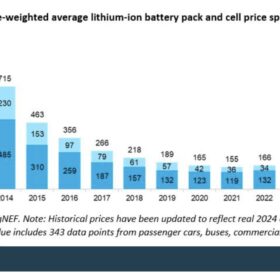ALMM cell mandate will drive up capital cost for solar developers, says Crisil report
The prices of domestically manufactured solar cells are 1.5-2 times more than alternatives from China even after basic customs duty. Such high prices can drive up the capital cost of solar power projects by INR 5-10 million/MW and, in turn, tariffs by 40-50 paise per kWh, says CRISIL Market Intelligence and Analytics.
US doubles solar polysilicon and wafer tariffs on China
The US government has doubled Section 301 tariffs on imported solar polysilicon and wafers from China to 50%. The materials are vital for manufacturing solar panels, from refining polysilicon to assembling modules.
BNEF: Lithium-ion battery pack prices drop to record low of $115/kWh
Battery prices continue to tumble on the back of lower metal costs and increased scale, squeezing margins for manufacturers. Further price declines are expected over the next decade.
Coal-based steelmaking plans jeopardize India’s net-zero target
The “build now, decarbonize later” approach misses the opportunity to develop steel capacity using low-emissions technologies, which could make India a leader in green steel capacity, save on decarbonization efforts later, and reduce current and future stranded asset risk in the industry.
India imposes antidumping duty on solar glass from China, Vietnam
India’s Ministry of Finance has imposed an antidumping duty on solar glass imports from China in the range of $673 to $677 per metric ton and for imports from Vietnam at $565 per metric ton.
How developing economies are leading the surge in solar power
Favorable government policies have played a crucial role in driving the adoption of solar energy in emerging economies. However, investment in grid modernisation and energy storage solutions is crucial to unlock the next level of sustainable solar integration in these economies.
US sets antidumping duties for Southeast Asian solar cells
US trade officials have announced preliminary affirmative determinations for antidumping duties on crystalline solar cell imports from Cambodia, Malaysia, Thailand and Vietnam. The tariffs range from 21.31% to 271.28% depending on the company and country.
U.S. Congressmen introduce bill to block implementation of 45X tax credit
Congressmen John Moolenaar and Jared Golden introduced a new bill that aims to halt advanced manufacturing tax credits.
The future of clean energy policies in a new Trump administration
With passage of a trifecta of clean energy legislation, the U.S. now has strong industrial policy that is building out domestic manufacturing, bringing jobs to the U.S., increasing clean energy capacity, driving the economy and more. What could change?
DGTR recommends anti-dumping duty on solar glass imports from China, Vietnam
India’s Directorate General of Trade Remedies (DGTR) has recommended an anti-dumping duty on solar glass imports from China and Vietnam after its investigation concluded that imports from these countries are undercutting the prices of the domestic industry. The landed value of the imports is below the selling price as well as the cost of the domestic industry.















